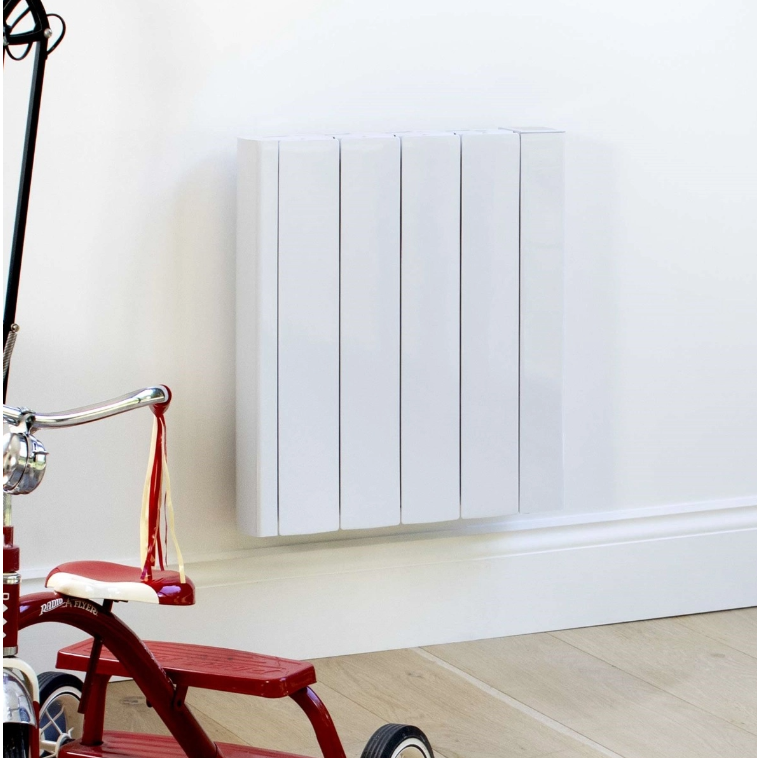

As the boiler ban quickly approaches and gas prices continue to rise, a growing number of us are seeking low-carbon alternatives to gas central heating. Efficient, versatile and smart, it’s no wonder electric radiators are an ever-popular choice. However, when it comes to making the switch, it’s important to consider how much this heating solution is going to cost you – that’s where we come in. In this article, we’ll tell you everything you need to know about running costs, as well as explaining how electric radiators can help trim down energy bills. But before we get into it, let’s first understand how this heating system works.
How do electric radiators work?
When it comes to heat transfer, these radiators produce both convective and radiant warmth – the former heating the surrounding air, the latter being absorbed by people, objects and surfaces. This combination provides a deeper level of heat that is also highly responsive, so you get the best of both worlds when it comes to warmth. Unlike gas central heating, electric radiators are standalone units that don’t rely on a pipe network or combustion, making them a maintenance free option. You can even pair these heaters with a renewable energy source, like solar panels, or opt for a green energy provider, for 100% efficiency from start to finish. Plus, most electric radiators are DIY friendly and require no annual safety checks, so you’re saving money before you’ve even switched the heater on!
How much do electric radiators cost to run?
To estimate the running cost of your electric radiator, follow this simple calculation below:
(Radiator output kW x hours in use) x pence per kW hour = daily cost of radiator (p)
Example: For an 800w radiator used on full power for 4 hours a day, just multiply 0.8kW by 4 to give you 3.2 kW/h. So, if you’re electric tariff costs 12p per kilowatt hour, simply times 3.2 kW/h by 12p, equalling 38.4p.
Having said that, this equation comes with a few limitations, largely because it overlooks key factors. As a result, it’s difficult to work out a standardised running cost that accurately represents cost. Here are a few examples of what the calculation doesn’t take into account:
- In-built thermostat: many electric radiators feature a thermostat which automatically turns the radiator on/off dependent on heat levels.
- Changes in weather: British weather is changeable to say the least, so how often you use your radiator will vary from day to day.
- Home insulation: homes that are well insulated are better at retaining heat, so these properties won’t need to use as much energy to maintain heat levels.
- Size of your room: low ceilinged areas and smaller spaces will warm up quicker, which means they’ll require less energy to heat up.
With these aspects compromising the accuracy of running costs, it’s perhaps more useful to consider the energy-saving properties of electric radiators. Automatic functions, precise thermostats and app control are designed to make heat management sophisticated yet easy to navigate, providing the tools you need to carefully monitor and finely tune your energy usage. Besides making use of these tools, we’d recommend switching to a cheaper electrical tariff if you haven’t already – head over to comparison sites and start shopping around to find the best available rates.
Three ways electric radiators can help save money
So, after you’ve switched your tariff, it’s time to start taking advantage of the energy-saving features of electric radiators. For some context, we’ve picked out the top three functions designed to keep running costs to a minimum.
Precise digital thermostats
As accurate as ± 0.1°C, precise digital thermostats accurately monitor room temperature and adjust your radiator accordingly so your space is never under/overheated, for optimum efficiency. Not only do thermostats eliminate the need for manual adjustment, but they also allow for zoned heating, with each radiator operating on a room-by-room basis. This marks a departure from costly centralised control, which requires heating your whole property whenever you want some warmth, resulting in money being wasted. Ultimately, radiators with precise digital thermostats are an absolute essential feature of any efficient heating system.
Top products with this feature: Ecostrad iQ Ceramic, Haverland Designer RC Wave+ and the Technotherm KS DSM
Weekly programming
Electric radiators with precise digital thermostats let you program warmth on a 24/7 basis, for complete control over your heating system. Create custom schedules for each room of the house to ensure warmth perfectly aligns with your routine – this way, your property will always be cosy/cool right when you need it to be. Besides maximum comfort, energy won’t be wasted heating rooms that aren’t in use, so running costs will be reduced as a result. Better yet, some self-programming electric radiators like the Haverland SmartWave create an intuitive weekly schedule based on your past movements, making manual adjustment a thing of the past.
Open window detection
This convenient feature detects sudden plummets in temperature and automatically switches the radiator off to save energy. So, if you leave a window open before you head out to work, the radiator will automatically turn itself off. Similarly, when you return home and close the window, the heater will spot a more stable temperature and switch the radiator back on for maximum comfort. This energy-saving tool is a great way to prevent heat losses through open windows, in turn boosting efficiency and helping you save money on your energy bills.
Top products with this feature: Ecostrad Allora iQ and Ecostrad Ecowärme
Smart electric radiators – the ultimate energy-savers
As smart as they are efficient, WiFi controlled electric radiators are designed to make saving energy as easy as possible. These savvy heaters let you adjust warmth via an app on your smartphone, from anywhere in the world. As on-the-go heat management gives you constant access to your heating system, never again do you have to worry about accidentally leaving your heating on and needlessly wasting energy.
At a glance – Ecostrad Ecosystem App
Compatible with any smart Ecostrad heater, Ecosystem excels in energy-saving heat management. A one-of-a-kind app, the Ecostrad Ecosystem allows you to control all of your radiators from one single point of use, so you can adjust heaters individually or program them to follow the same schedule. Use a smooth slider function to micromanage warmth and copy and paste settings over multiple days, for convenient control at its finest.
Switch between Comfort, Eco and Anti-Frost mode to achieve ideal temperatures and ensure your property is heated your way. You can even make use of the voice control tool, which lets you pair your radiator with Amazon Alexa or Google Home Assistant to adjust warmth via snappy voice commands. By allowing you to finely tune energy usage from the palm of your hand, the accessible Ecostrad Ecosystem app makes saving energy that much easier.
Make the switch today
Whilst gas is cheaper in theory, electric radiators are equipped with a range of exceptional controls designed to promote energy-efficient warmth, so trimming down energy bills has never been more straightforward. From precise thermostats to modern WiFi connectivity, these energy-saving saving features mean you can adjust heating to perfectly match your monthly budget, without any of the hassle. Plus, with such a versatile range of sizes and designs to choose from, you can even select an electric radiator that best suits your preferences. So, make the switch today and browse our full range now.
Key takeaways
- Rather than calculating running costs, it’s perhaps more useful to focus on the energy-saving properties of electric radiators
- Exceptional controllability in the form of automatic functions & precise thermostats boost efficiency and help trim down energy bills
- On-the-go heat management via app control provides 24/7 access to your heating system, so you can always stay on top of your energy usage








